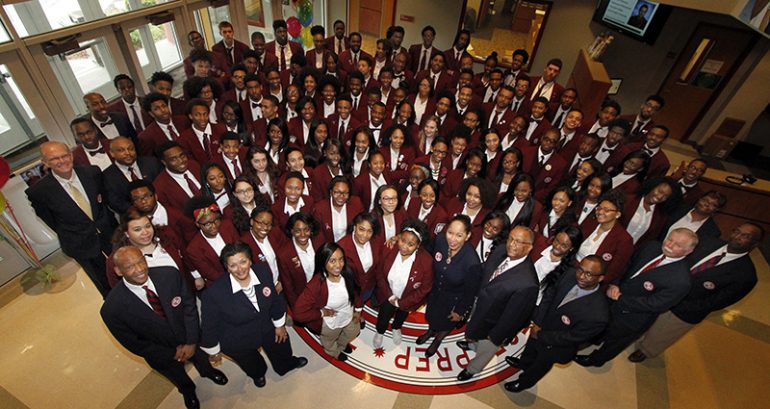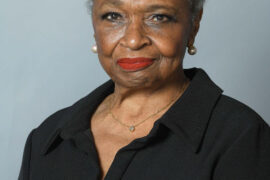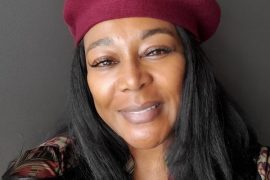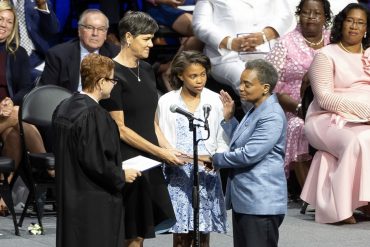Some say she has the quiet tenacity of Rosa Parks. Others suggest that her resourcefulness and ingenuity are reminiscent of renowned educator Marva Collins. Recently honored as a risk taker, some might liken her to the legendary Ida B. Wells.
While she counts it an honor to be considered in such great company, Dr. Blondean Y. Davis stands apart as a 21st century no-nonsense educator and visionary whose mustard seed faith has blossomed into a top notch college preparatory high school that began seven years ago as the germ of a dream.
Her students know her as Dr. Davis. Her community has come to know her as the administrator who could. And those who have watched her students’ success measured by academic achievement and millions of dollars in scholarships, know her as a modern-day success story who lives by example before her students to show them that all things are possible if you work hard and dream.
Her driving force is educating children. Davis has a laser-focused passion to ensure that any child enrolled in Matteson District 162 elementary and middle schools, where she is Superintendent, or at Southland College Prep Charter High School, where she serves as its founding CEO, has the opportunity to achieve their highest potential.
Recently, Dr. Davis received the National Alliance of Black School Educators Ida B. Wells Risk Taker award in recognition of her “personal and professional sacrifices in the advancement of education for African-American students.”
In 2008, she was named the Illinois Association of School Administrators Superintendent of the Year, an honor she rightfully could well receive annually.
Both awards recognize her significant accomplishments to advance the educational opportunities for all her students.
With more than 40 years experience in the profession, Davis knows education and knows how to make it work. Her achievements through the years border on the miraculous.
Davis became superintendent of the south suburban Matteson School District 162 in 2002, overseeing six elementary schools and a middle school with some 2,900 students.
When she arrived, only 55 percent of the district’s students met or exceeded the proficiency goals of the Illinois Standards Achievement (ISAT) Test.
In five years under her leadership, those scores increased by almost 50 percent. After just three years, in 2005, one of the schools was named among the top elementary schools in the south suburbs based on its composite ISAT score.
By 2008, all of Davis’ schools had received the Illinois Academic Improvement Award and several have become Illinois Spotlight Schools. In 2009, Arcadia School, which serves kindergarten through third grade students, earned the coveted National Blue Ribbon School designation by the U.S. Department of Education.
A Different Kind Of High School
[columns_row width=”two-thirds-and-third”]
[column]
Davis’ secondary school Southland College Prep Charter High School in Richton Park opened in 2010 and has graduated just three classes, but 100 percent of those graduates have been accepted at four-year institutions of higher learning.
And not just any four-year schools.
Southland graduates have been accepted by Harvard, Yale, Columbia, Stanford, Duke, University of Pennsylvania, Johns Hopkins, Dartmouth, Northwestern, Brown, Cornell, Vanderbilt, Notre Dame, Georgetown, University of Virginia, Vassar and scores more.
More than $60 million in merit-based scholarships have been offered to Southland’s first three graduating classes and to the class of 2017.
Last year, co-valedictorian Christian Davis was accepted by 36 colleges and universities 20 among the top 50 schools in the U.S. and four Ivy League schools. He was offered more than $5 million in merit-based scholarships and today is enrolled at Stanford University, where he is pursuing a career that will combine engineering and neurosurgery.
Graduates of Southland’s first three classes have been accepted by more than 300 colleges, including every major four-year public university in Illinois, 12 of the 14 “Big Ten” schools, 38 of U.S. News & World Report’s Top 50 Colleges, and seven of the eight Ivy League schools, plus Stanford.
Southland was conceived after area parents approached Dr. Davis about creating a secondary school as an option because local high schools were struggling with declining test scores and climbing dropout and suspension rates.
Southland became the first charter public high school approved by the Illinois State Board of Education in Chicago suburbs.
[/column]
[column]
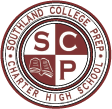
The Southland College Prep Creed
***************************************
The Southland Family Thinks:
-The strong should take care of the weak;
-The students of today are the leaders of tomorrow;
-We are a family-oriented school;
-Anything worth doing is worth doing right;
-Our responsibilities never end;
-Our education does not end in the classroom;
-The only way to lose is to quit trying;
-Learning is the key to ultimate success;
-We are all here to make a difference;
-The journey, not the arrival, is what matters most;
-Success is not measured by wealth, but by happiness.
The Southland Family Acts:
-We give one hundred percent every day;
-We act in a way that leaves a lasting impression;
-We are ready and willing to work hard;
-We each need to perform to the best of our abilities;
-We always leave a place better than we found it;
-We are role models for other students;
-When we all pull together we can move mountains;
-We give back to our community;
-We are Southland College Prep.
[/column]
[/columns_row]
In a recent comparative study by the Illinois Network of Charter Schools, Southland College Prep ranked number one for ACT performance, attendance and graduation rate among all Illinois non-selective enrollment high schools with a 75 percent or greater African-American student enrollment and a 50 percent or greater rate of students qualifying for free/reduced lunch.
The secret of her success, Davis says, is that “I know what is necessary to run a good school. I know why schools don’t work for students. I know that whether you call it a charter, independent, Catholic, or whatever entity educates our children that we as an African-American community simply want the best for our children.”
Much of that learning of “what is necessary to run a good school” took place in the Chicago Public Schools (CPS), where Davis served for three decades and was a virtual gold mine of educational expertise for Chicago’s school system.
Rooted In Chicago’s Schools
A product of the Chicago public schools herself, Davis graduated from Englewood High School on the city’s South Side and earned Bachelor’s, Master’s and Doctorate degrees, all in Education, from Loyola University Chicago. She holds a Doctor of Humane Letters from both Governors State University and Tougaloo College, an historic Black college.
In 1970, she joined CPS and served as a teacher, counselor, assistant principal, principal, district superintendent and deputy chief education officer.
Then, from 1995 to 2001, she was Chief of Schools and Regions for CPS. As one of the top leaders for Schools CEO Paul Vallas, Davis was responsible for the daily management of seven regions and 601 schools.
Her office also managed employee discipline, expulsions, the Zero Tolerance policy, art, music, libraries, gym, the transfer policy and attendance the daily nuts and bolts of the system. Her responsibilities allowed Davis to manage school operations while remaining integral to the development of educational policy and procedures.
During her time with CPS, Davis says she learned what didn’t work and chalked up poor performance of the schools to “limited resources, constant cutbacks over the years, mostly in the classroom” and to the system’s acceptance of a social promotion policy, which suggests that the trauma of failing a grade is second only to the death of a child.
“But, I believed that every child has a right to learn and to achieve the 21st century skills needed for success to think critically and to problem solve,” Davis says.
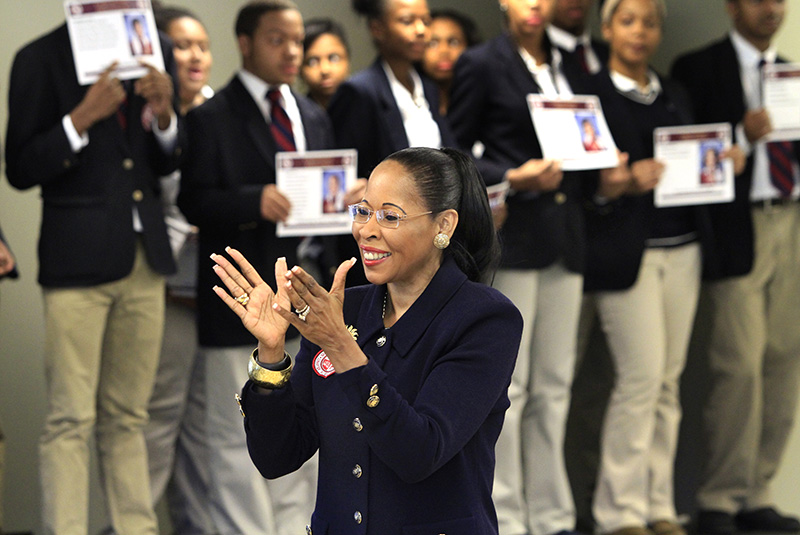
A New Challenge
In August 2001, she joined Saint Xavier University as an Associate Professional Lecturer, where she trained prospective school principals.
The following year, she accepted the superintendency of Matteson School District 162, where she arrived with a vision of how she wanted to achieve excellence for her students.
Her aim was directed along two lines acceptance by administrators, principals, faculties, parents, students and community leaders of new levels of responsibility to produce a true learning community and implementation of a more rigorous curriculum and instructional program.
At Southland College Prep the curriculum is more than rigorous.
During a European-Asian model, nine-hour school day, students take four years of foreign languages, math, science and the arts. Southland’s graduates earn credits for more than a full year of courses taken by most other Chicago-area high school students.
Only after being in school from 8 a.m. to 5 p.m. do students participate in a full roster of IHSA sanctioned sports and extracurricular programs.
Technology is a cornerstone at Southland, where four years of courses in that field provide graduates with a 21st century education.
In addition to the academic preparation, Southland offers every student an extensive, personal college counseling program under the premise that students have unlimited possibilities and unlimited potential.
Our students are not angry. They’re not fighting in the halls. They’re just waiting for the next good thing to happen to them.
Davis explains, “We offer an excellent college counseling program for every student. Central to it is a lengthy individualized family conference during the summer months where anybody who has anything to do with the student parents, grandparents meets with our college counselors and explains what their wishes and dreams are for this young person.
“Then, working with the students over the course of many months, our counselors help them create and craft their unique stories which highlight their accomplishments, hopes and dreams.
“Together, the counselors, students and their families analyze and select the best colleges for each student. Then we work hard to place them in those schools and see that they not only are admitted, but also we secure significant merit-based scholarships to help ease the tremendous burden of college expense,” Davis says.
A college tuition loan should be a last option after all other avenues have been explored, she asserts.
Reinforcing Core Values
A third crux of Davis’ educational vision is discipline. “I know that our children want structure and in our community, the character values that we had over the years have disappeared,” she says.
So Davis begins every morning at Southland with students reciting from memory a creed that reaffirms their values and positive actions.
“I believe that starting the day with such memorable words is the reason we don’t have monumental student discipline issues,” Davis says. “After a while, the words of the creed become much more than a mantra they become part of the students’ being.”
At Southland, education is a family affair. “I believe in bringing the whole family together, to talk about students’ needs,” Davis says. When Davis says “the family,” she means that “the whole village is involved administrators, teachers, clerks, and the lunchroom, maintenance and security staff as well.”
The family is now about 4,000-strong. That includes the 2,800 students and 600 adult staff in Matteson District 162 schools and the 530 students and 40 adult staff at Southland College Prep.
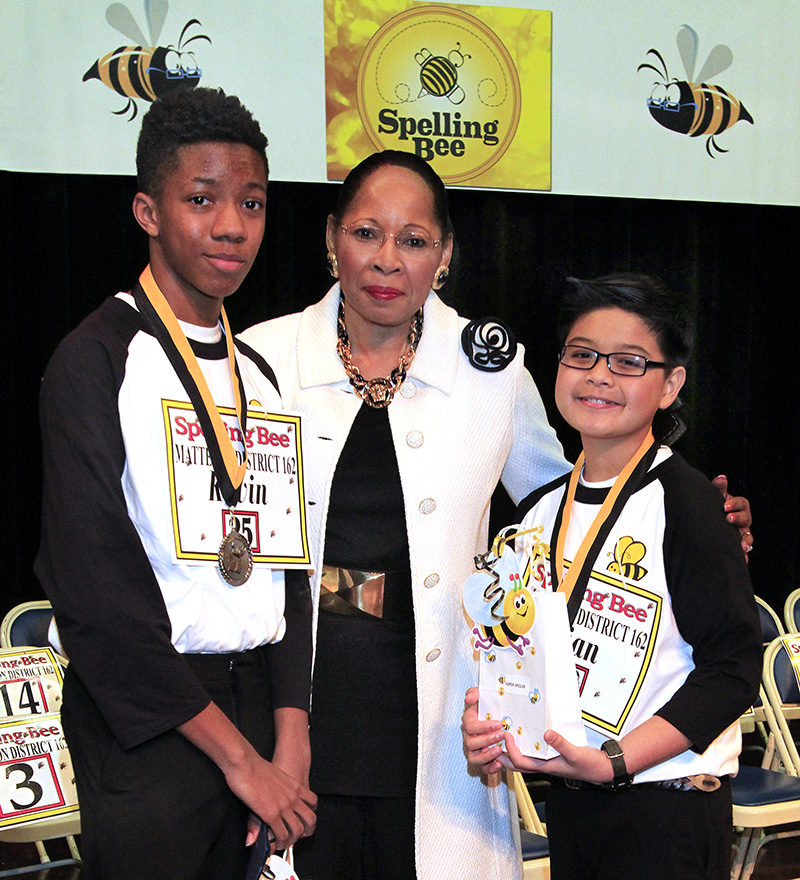
“We talk about our values, who we are. I know that you have to get in the heads of these students to let them know that we don’t behave as one would on the streets; that there are some things that just cannot be permitted within the family,” Davis says.
“I tell them why I’m doing what I’m doing, why we can’t do this. Everything is based on concepts that really are not so much religious as much as what this country represents.
“I know that families really want their children to be successful. But, to be successful, there are certain kinds of common experiences and values that have to exist.”
A Mighty Family
When Southland alumni return for the summer, Davis hires them as tutors in her elementary schools because summer jobs are scarce, but also because, “Who better to teach the smaller children?” she asks.
“Then, instead of bringing in outsiders to clean the District buildings, young alumni work alongside our maintenance staff to strip floors, clean carpets and paint. Many alumni work with the technology team updating systems and infrastructure for the next school year’s programs.
“I tell our graduates that for four years, we’re going to stick with you through college. Your Southland diploma means we have an obligation to make sure you’re successful. You come home during the summer; you come here, this is your home. It will be okay.
“You have a problem away at school or anywhere, this is the phone number that you call. And, we dispatch our senior staff across the U.S. to visit alumni to learn how they are doing in college, buy them a dinner, and take them to a play or a concert.”
Because of the nurturing family atmosphere at Southland, Davis says, “Our students are not angry. They’re not fighting in the halls. They’re just waiting for the next good thing to happen to them.
Southland serves students, 99 percent of whom are minorities, from middle-class to high-poverty families in Country Club Hills, Flossmoor, Hazel Crest, Homewood, Matteson, Olympia Fields, Park Forest, Richton Park and Tinley Park.
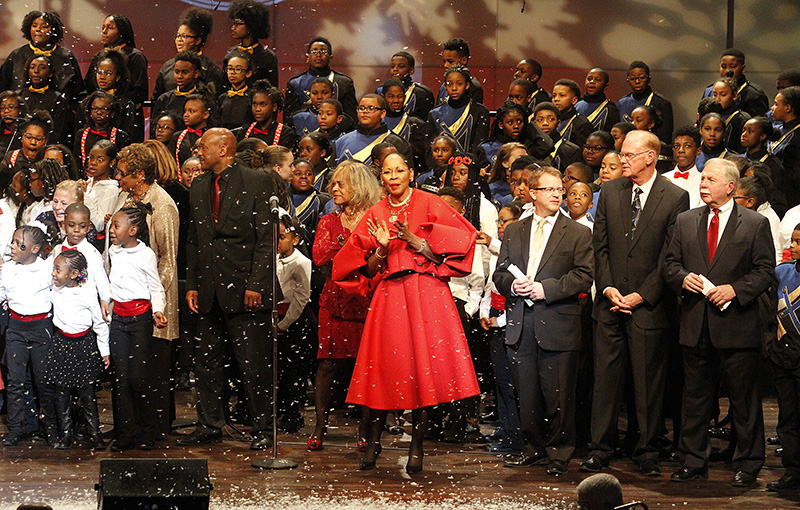
Southland is housed in a three-story former insurance call center that has been totally repurposed and wired into a 21st century secondary school. It sits on an eight-acre site at 4601 West Sauk Trail in Richton Park and compares favorably academically to the acclaimed Marian Catholic High School in the area, but without the exorbitant tuition cost.
Proof of Davis’ excellence as an educator is that for all of Southland’s success, it has a non-selective enrollment policy. Unlike some charter schools, it doesn’t skim the cream of the crop of the best area students; admission is only by random public lottery. So the 130 student names that pop up first in the lottery machine during a well publicized community event comprise the next year’s freshman class.
At that point in time, the Southland family doesn’t know if any of these lottery-selected students have individual education plans that require special education services. It doesn’t know if they’ve been in 20 fights, nor if theirs is a no-parent household or a homeless family.
Southland doesn’t know and doesn’t focus on those issues at this point. But once enrolled, it will certainly learn and do all it can to be sure that every student is successful.
“We say, whoever you are, welcome. But first, we’ll see you for a two-week summer Freshman Academy that will prepare you for four years at Southland. And, when you graduate you will be prepared to go to college,” says Davis.
About her significant success and achievements, the educator says, “It’s very interesting what can be done and thinking about why it’s not done.
“We don’t have a lot of money; we don’t receive any more operating funds than other public high schools in the district. But if we can accomplish quality education here in the far south suburbs, you know that it can be replicated in Chicago, Detroit and elsewhere.
“But when you examine the stats of African-American high schools nationwide that look like us, one has to ask, how and why does a small school district like this excel when others fail?”


